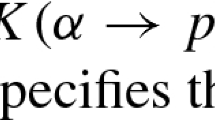Abstract
Antirealists who hold the knowability thesis, namely that all truths are knowable, have been put on the defensive by the Church–Fitch paradox of knowability. Rejecting the non-factivity of the concept of knowability used in that paradox, Edgington has adopted a factive notion of knowability, according to which only actual truths are knowable. She has used this new notion to reformulate the knowability thesis. The result has been argued to be immune against the Church–Fitch paradox, but it has encountered several other triviality objections. Schlöder in a forthcoming paper defends the general approach taken by Edgington, but amends it to save it in turn from the triviality objections. In this paper I will argue, first, that Schlöder’s justification for the factivity of his version of the concept of knowability is vulnerable to criticism, but I will also offer an improved justification that is in the same spirit as his. To the extent that some philosophers are right about our intuitive concept of knowability being a factive one, it is important to explore factive concepts of knowability that are made formally precise. I will subsequently argue that Schlöder’s version of the knowability thesis overgenerates knowledge or, in other words, it leads to attributions of knowledge where there is ignorance. This fits a general pattern for the research programme initiated by Edgington. This paper also contains preliminary investigations into the internal and logical structure of lines of inquiries, which raise interesting research questions.
Similar content being viewed by others
Notes
One can show similarly that, if \(\Diamond K\phi \) is supposed to be necessarily factive, then \(\Box \phi \) follows from it.
The following example was given by Lorenz Demey and roughly the same example was given by an anonymous reviewer.
This example is based on (Edgington 1985, p. 565).
I am assuming here that it is meant that the ‘without changing the truth value of q’ bit is within the scope of the knowledge that has been imparted by the course of inquiry i.
Julian J. Schlöder suggested an ‘algebra of lines of inquiry’ during discussion of his work in Leuven on 22 February 2019.
By the way, it could also have happened that both vessels go north and that they detect the presence of each other (although that is not always the case). But even if there were a detection of the other vessel, it is not easy to find out about the detection technology on board of the other ship. There remains de re ignorance about the other line of inquiry.
References
Artemov, S., & Protopopescu, T. (2013). Discovering knowability: A semantic analysis. Synthese, 190(16), 3349–3376.
Brogaard, B., & Salerno, J. (2006). Knowability and a modal closure principle. American Philosophical Quarterly, 43(3), 261–270.
Dummett, M. A. E. (1991). The logical basis of metaphysics. Cambridge: Harvard University Press.
Edgington, D. (1985). The paradox of knowability. Mind, 94(376), 557–568.
Edgington, D. (2010). Possible knowledge of unknown truth. Synthese, 173(1), 41–52.
Fara, M. (2010). Knowability and the capacity to know. Synthese, 173(1), 53–73.
Fischer, M. (2013). Some remarks on restricting the knowability principle. Synthese, 190(1), 63–88.
Fitch, F. B. (1963). A logical analysis of some value concepts. Journal of Symbolic Logic, 28(2), 135–142.
Fuhrmann, A. (2014). Knowability as potential knowledge. Synthese, 191(7), 1627–1648.
Hart, W. D. (1979). The epistemology of abstract objects: Access and inference. Proceedings of the Aristotelian Society, 53, 153–165.
Hart, W. D., & McGinn, C. (1976). Knowledge and necessity. Journal of Philosophical Logic, 5, 205–208.
Heylen, J. (2020). Factive knowability and the problem of possible omniscience. Philosophical Studies, 177(1), 65–87.
Hintikka, J. (1962). Knowledge and belief. Ithaca: Cornell University Press.
Kaplan, D. (1989). Demonstratives. In J. Almog, A. J. Perry, & H. Wettstein (Eds.), Themes from kaplan (pp. 481–563). Oxford: Oxford University Press.
Kripke, S. A. (1963). Semantical considerations on modal logic. Acta Philosophica Fennica, 16(1963), 83–94.
Kvanvig, J. (1995). The knowability paradox and the prospects for anti-realism. Noûs, 29(4), 481–500.
Lewis, D. K. (1973). Counterfactuals. Hoboken: Blackwell.
Rabinowicz, W., & Segerberg, K. (1994). Actual truth, possible knowledge. Topoi, 13(2), 101–115.
Schlöder, J. J. (2019). Counterfactual knowability revisited. Synthese, 1–15
Spencer, J. (2017). Able to do the impossible. Mind, 126(502), 466–497.
Tennant, N. (1997). The taming of the true. Oxford: Oxford University Press.
Williamson, T. (1987). On the paradox of knowability. Mind, 96(382), 256–261.
Acknowledgements
I am particularly grateful to Julian J. Schlöder, who presented his work in Leuven on 22 February 2019 and with whom I could discuss his work before and after the presentation. Part of my paper has been presented at the XX Jornadas Rolando Chuaqui Kettlun (Santiago de Chile, 27 August 2019–30 August 2019). I am grateful to the organizers for their invitation and I would like to thank the audience for their feedback. In addition, I would also like to thank Felipe Morales Carbonell, Lars Arthur Tump and Lorenz Demey for their feedback on this paper. Special thanks goes to Lorenz Demey for discussion of Sect. 3. Last but not least, I am thankful to two anonymous reviewers for their very helpful reviews.
Author information
Authors and Affiliations
Corresponding author
Additional information
Publisher's Note
Springer Nature remains neutral with regard to jurisdictional claims in published maps and institutional affiliations.
Research for this article was generously sponsored by the Fund for Scientific Research – Flanders (Project Grant G088219N), which is gratefully acknowledged.
Rights and permissions
About this article
Cite this article
Heylen, J. Counterfactual Knowledge, Factivity, and the Overgeneration of Knowledge. Erkenn 87, 2243–2263 (2022). https://doi.org/10.1007/s10670-020-00300-w
Received:
Accepted:
Published:
Issue Date:
DOI: https://doi.org/10.1007/s10670-020-00300-w




